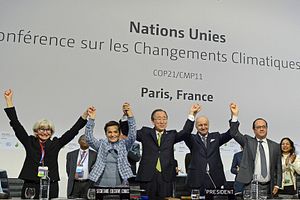On Saturday, 195 countries approved a landmark deal committing the world to limit a rise in global temperatures to 2 degrees Celsius – with the more ambitious target of 1.5 C. UN President Ban Ki-moon praised the “truly universal agreement on climate change” as a “historic moment,” language that would be echoed around the world.
Plans for emissions cuts already presented to the UN by 186 national governments will only get the world halfway to the goal of capping global warming at 2 C – which is why the Paris agreement calls for upgraded commitments every five years. Countries will also be required to monitor and report how they are doing in implementing their commitments to emissions cuts.
While the world celebrated, a commentary from Xinhua called the deal “a particularly sweet victory for China, which emerged to take a leading role” in the negotiations. The piece points to China’s recent commitments on climate change as a sign of its new role as a world leader in that regard. In the past year alone, China has signed climate change agreements with the United States and France (the host of this year’s conference); submitted an Intended Nationally Determined Contribution to the UN, pledging to have emissions peaks by 2030; and committed 20 billion RMB ($3.1 billion) to help developing countries deal with climate change.
Xinhua also described a more concrete way China pushed the talks forward. The commentary says Chinese negotiators teamed with the United States and France “to ensure the agreement was adopted” after some parties expressed doubts. China, which has staunchly defended the developing world’s right to continued economic growth, would be in the best position to bring the G-77 along on a final agreement.
China’s chief negotiator, Xie Zhenhua, in particular has been outspoken about the need to keep the principle of “common but differentiated responsibilities” enshrined in the Paris agreement, insisting that developed countries fulfill previous commitments to provide money and technology to help the developing world fight climate change.
Given that emphasis from Xie, and Beijing’s track record as a representative for the developing world at climate talks, knowing China was on board with the deal may have been enough to convince some developing countries to let go of their insistence on a legally binding commitment for the developed world to provide $100 billion per year to help the developing world mitigate the effects of climate change. China also ensured that the five-year reviews would include “flexibility” for developing countries – which could ultimately mean they become merely optional for the developing world.
U.S. President Barack Obama apparently agreed that China played a constructive role at the talks. According to a statement from the White House, he spoke with Chinese President Xi Jinping on the phone Monday “to express appreciation for the important role China played in securing an historic climate agreement in Paris.” Xi and Obama noted “close coordination” between their negotiating teams in reaching the agreement, and promised to work together to ensure the successful implementation of the Paris deal, according to Xinhua.
Xie called the deal a “crucial point in the global climate governance process.” While acknowledging the Paris agreement “is not perfect,” he said it would allow the world to move “one historical step forward.” He also expressed optimism that the Paris agreement would ultimately benefit Beijing’s domestic economy: “It should provide a lot of impetus for China’s own green, low-carbon development and as we implement it, it will promote our own domestic sustainable development.”
China’s Foreign Ministry also praised the agreement, calling it “comprehensive, balanced, and ambitious” in a statement. “The Chinese delegation, who took a responsible, cooperative and constructive part in the negotiation, played an important role in bringing the Paris conference to a final deal,” spokesperson Hong Lei added. “This gives full expression to China’s sense of responsibility as a major country in tackling climate change.”
“The Paris conference is a new starting point for international cooperation on climate change,” Hong said. It also apparently marks a new beginning for China’s efforts; along with the work China’s delegation did in Paris, Hong promised China “will contribute more” in the future.

































